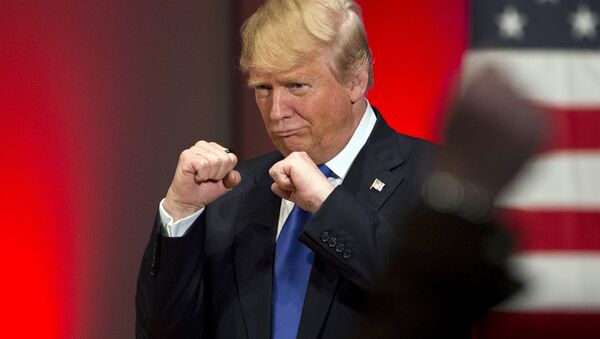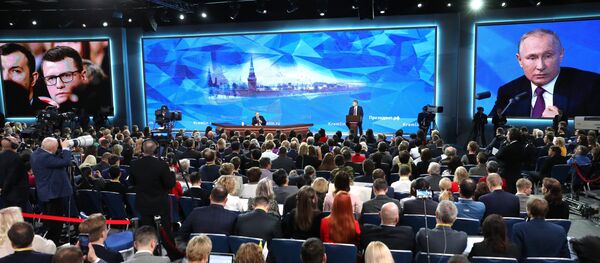It is really very hard to predict what will happen next after US President Donald Trump's potential pullout from the 1987 Intermediate-Range Nuclear Forces (INF) Treaty, Aydin Sezer, the head of the Turkey-Russia Research Centre, the Ankara-based think tank, told Sputnik commenting on Vladimir Putin's December 20 press conference.
"[President] Putin is right", the Turkish scholar emphasised. "It is really very hard to predict what the next step will be. History will record this period as Trump's era. Trump governs the country as if it's a company. In every aspect of foreign policy, he seriously disagrees with both the establishment and Congress as well as with Pentagon".
According to Sezer, Trump "does not respect any international commitments" including NATO, the World Trade Organisation, the Joint Comprehensive Plan of Action (JCPOA) with Iran or the INF. "For this reason we must admit that this is his general attitude", the scholar opined.
"They [the US] are withdrawing from the INF Treaty", the president said. "It's hard to imagine what will happen next".
For his part, Sezer believes that Trump's foreign strategy serves as a sort of distraction from the internal political struggle underway in the US: "As we all know that he has legitimacy problems from the very beginning. For this reason, he takes advantage of every opportunity and all means to divert public attention to the foreign policy issues", the scholar suggested.
"He feels the need to display more aggressive behaviour particularly when it comes to the Russia-related issues", Sezer presumed. "By these means he thinks he will be able to prove that Russia does not have an impact upon him. Trump is a very pragmatist leader, able to take every irrational step on any issue".
Given this, none of Trump's extravagant moves will come as a surprise, according to the Turkish scholar.
US Withdrawal From Syria
According to Sezer, while it appears that the US is ready to pull out, it's unlikely that the American military presence in Syria has ended.
"This is related to the US foreign policy", the scholar believes. "Since 9/11, the US policy has not been a balanced and consistent one. It was like that during Obama's period as well. During the election process, Trump took office by criticising this foreign policy. He promised to make investments that would enable business potential in the US, instead of military expenditures. For this reason, I do not see the decision of the US to pull the troops out of Syria as surprise news. However, I doubt that the US will be withdrawing entirely".
"One of the countries to be mostly affected by Trump's decision of leaving Syria will be Turkey", the scholar highlighted. "As is known, the US has been quite uncomfortable with Turkey and Russia getting closer, as well as the S400 [deal]".
Sezer recalled that the US had claimed that its involvement in Syria and Iraq was to bring about peace and build democracy in Syria; then Washington elaborated that the reason for being in Syria was to fight against Daesh (ISIS/ISIL)*. For his part, Donald Trump added yet another objective — to contain Iran's "expansion" in Syria in order to shield Israel.
"In brief, [Trump] brought up almost all subjects to the agenda, apart from the future of Syria", Sezer highlighted. "As a result, the people of Syria have paid a heavy price. Even if the US withdraws from Syria in actuality, the effects of its faulty policies in Syria will continue to last for a long time".
Trump's announcement about the withdrawal from Syria prompted Vladimir Putin to draw parallels between Washington's Syrian campaign and the country's 17-year-long combat force participation in Afghanistan. He referred to the fact that US troops have been deployed in the Central Asian country for over 17 years despite Washington's vows to leave the country. The Russian president underscored that the US military presence was illegitimate.
*Daesh (ISIS/ISIL/Islamic State) is a terrorist group banned in Russia.
The views and opinions expressed by the speaker do not necessarily reflect those of Sputnik.




